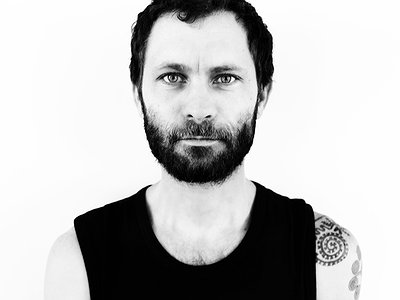Name: Giovanni di Domenico
Nationality: Italian
Occupation: Pianist/Composer
Current Release: Downtown Ethnic Music (Decay Music N.4) on Die Schachtel
Recommendation: Peter Mettler movies - all of them / Sant’Apollinare in Classe, 6th century church in Italy
Visit Giovanni’s website giovannididomenico.com to find news, videos, links and info about his work.
When did you start writing/producing music - and what or who were your early passions and influences? What is it about music and/or sound that drew you to it?
I don’t know when all this started, I never really did anything else since I was a kid. Still, if I’d have to freeze a moment, it would be at the age of 10/11 years old, I got my first jazz vinyl from my dad, a double LP compilation with the likes of Miles, Duke, Coltrane, etc. I listened to this double LP with headphones in the living room while my sisters were watching TV. I loved that! We were listening to a lot of opera at home (yeah, an Italian household!), but I think jazz (and that double album) was the kind of music that made me completely fall in love with music. At about the same time, my parents also bought a piano for my sister, but I loved it, and was trying to play everything by ear and imitating the things I loved and from there I began writing my first compositions.
For most artists, originality is first preceded by a phase of learning and, often, emulating others. How would you describe your own development as an artist and the transition towards your own voice? What is the relationship between copying, learning and your own creativity?
I don't think originality, in terms of doing something that has never been done before, is something I strive for. I don't make music to demonstrate that I can do it differently; actually, the only thing I want to prove is my gratitude to the magnificent music and musicians that I loved and continue to love. I like to think of my artistic journey as an ongoing homage to all those that made me cry with joy and grief when listening to their sounds.
Listening is an inspiring process and continuous encouragement in moving forward. Also, copying is a critical process of learning for me. I love pastiches and stuff like that!
What were your main compositional- and production-challenges in the beginning and how have they changed over time?
Sometimes, I feel like nothing has changed since the beginning. In my teens, I became aware that I would make music for the rest of my life. I did not change direction nor gave myself the slightest possibility to do something else. Of course, the way I composed music changed. When I was a teenager, I would feel more like a "romantic" musician, with all the struggles a romantic soul has….channeling the same sentiments that Chopin or Jarrett conveyed while composing on the piano. Now I feel a little more detached from that kind of view and approach, but that's also part of becoming an adult. I always want to discover and set new goals for myself. Over the years, I learned how to use a studio, track instruments, and mix them better - not that I am done with that anyway. I will always maintain an open attitude and remind myself of the importance of going deeper and learning new things - all the time.
What was your first studio like? How and for what reasons has your set-up evolved over the years and what are currently some of the most important pieces of gear for you?
Oh, my first studio (although calling it that way is a BIG thing!) was in the cellar of my family's apartment in Rome in the mid-'90s - the same cellar where my grandparents used to hide during WWII bombings. My dad and I did some work so I could use it for my things. It was great.
I had the minimum requirements to play and record the various bands I was part of in the local punk/hardcore scene (I played drums, electric guitar, and keys in several bands). If I listen to the recordings now, they suck big time! But at that moment didn't matter - it was too good to have a drum-set, few amps, a 16 channels mixer, and a few SM57/58 - or at worst - to record everything, even drum overheads. Although sometimes it felt like I had wasted time, it brings me joy to remember that this was one of the starting points of my music-making. In retrospect, I feel the importance of trying to do doing things the most DIY you can, no matter what.
How do you make use of technology? In terms of the feedback mechanism between technology and creativity, what do humans excel at, what do machines excel at?
I love technology; I mean technology applied to music for sure. But of course, the “dark” side of the ease it brings is also there, mainly there being lots of shitty music around too. But on the other hand, there’s always been shitty music; it just sounded a bit better. Nowadays, there are way too many bad productions, so over-compressed that I can’t understand where it will lead. How loud can you master things?
Production tools, from instruments to complex software environments, contribute to the compositional process. How does this manifest itself in your work? Can you describe the co-authorship between yourself and your tools?
The studio is a big part of my daily work, especially if you take projects like Downtown Ethnic Music, my recent contribution to Die Schachtel's Decay Music series.
It was recorded over more than ten years with various audio material, from the most crappy telephone recordings to sounds recorded in theaters and pro studios. This LP is essentially the result of studio work and me getting lost in playing different instruments. Many compositions/ideas/songs came from playing the piano (mostly), guitar, synths or whatever I have in my studio - all sorts of acoustic and electric instruments I’ve been collecting through the years. For me they are all equal, and they all open up possibilities. And opening myself to possibilities is what I enjoy the most.
Collaborations can take on many forms. What role do they play in your approach and what are your preferred ways of engaging with other creatives through, for example, file sharing, jamming or just talking about ideas?
Following and feeling a particular musician or artist path you admire can be extremely rewarding, and surely, if I have the chance to share a bit of that path with them it's even better. There is a phrase from the lyrics of Steely Dan’s “Deacon Blues” that goes: “sharing the things we know and love with those of my kind”. Well, that’s a BIG thing for me, one of the basis on which I want to build my life. That principle (and the life that goes with it) is what's brought me the happiest times - discovering something new and exciting from somebody that discovered it before you and who shares your passion. Obviously, this open/positive attitude has its negative side; when I don’t like something, or someone tries to make me like something I can’t relate to … well, that doesn’t really work.



